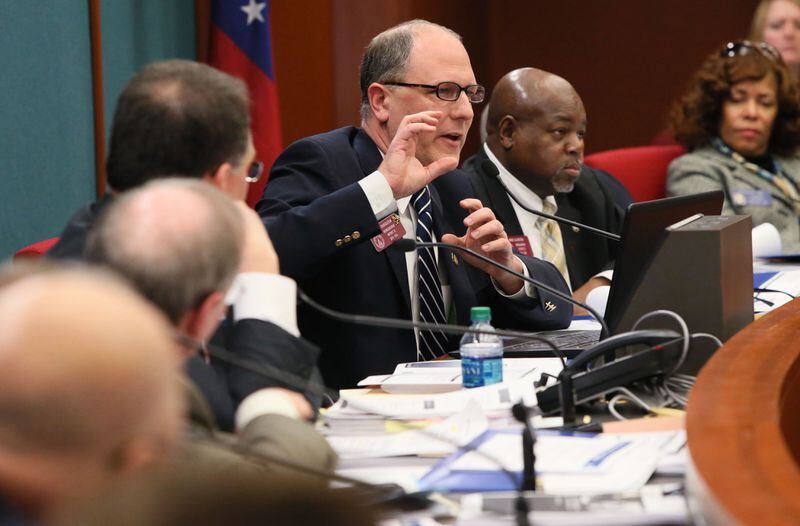Outgoing state Rep. Mike Dudgeon, R-Johns Creek, makes a strong appeal today for passage of the Opportunity School District, Amendment 1 on the ballot, in this column.
A former school board member in Forsyth County, Dudgeon has a bachelor's and master's degrees in electrical engineering from Georgia Tech and has an interest in education issues. Dudgeon chose not to run for re-election this year so he is serving his final months as a state representative.
By Rep. Mike Dudgeon
I spent four years on the Forsyth County School Board and six years in education leadership of the House of Representatives working to improve public education. From that deep experience, I can tell you that voting “Yes” for Amendment 1 is the right move for Georgia. It gave me the perspective needed to know how important the Opportunity School District is to the 68,000 kids forced to attend Georgia’s failing schools.
First, I am a huge believer in local control and consistently voted that way, supporting policy in that area. I sponsored a bill in 2012 that repealed 30 sections of top-down education control and fought against dozens of other new state education regulations. From the opposition’s TV ads funded by national unions, who are not even remotely local, our citizens are being told that the OSD destroys parent and local control and is a power grab for the state. This is simply not true.
Credit: Maureen Downey
Credit: Maureen Downey
The legislation behind the OSD identifies the requirements for community input and sets models for local stakeholders to be part of the decision process. When I traveled with Gov. Nathan Deal to see the successful Recovery School District in New Orleans, we heard loud and clear that they tried to do it “top down” at first, and only saw results once they involved the community and local input.
Common sense says you cannot “run a school” remotely from the capitol in Atlanta and that is not what will happen under the OSD. It is interesting that many of our failing schools are today in systems with very expensive, bloated, and unresponsive central office bureaucracies, yet it is the OSD being criticized for lack of local control.
In addition to local control, I strongly support our Founding Fathers’ wonderful gift, the idea of checks and balances in government. I want the local boards to run their schools, but if they are unwilling or unable to make meaningful changes for schools that have failed for three or more years in a row, there needs to be a “check.” That check is the state, which is already paying roughly half the bill for the school in most cases. The intent of the OSD is only to take the worst of the worst and not interfere when local boards are already on a recovery path. Just the mere possibility of the OSD has motivated some local boards to start turnaround plans for schools on the failing list. Having someone looking over the shoulder of local boards gives greater accountability and will motivate them.
The OSD will set clear accountability for schools and change expectations. Another amazing thing I saw in New Orleans was a K-8 school with almost 100 percent minority and 100 percent poverty. It had been an F school until a new principal turned it around to a B-/C+ school. She told me that these turnaround efforts excelled by strengthening school leadership and by raising expectations for her staff and her kids, including removing any attitudes of “these kids can’t learn.” No new money was involved. Culture and leadership are the ingredients for success.
Another claim from the opposition to OSD is that the “real” solution is simply more money, or that the amendment will be an expensive addition of state bureaucracy. Study after study has shown that more money is not the simple answer. Gov. Deal and the Legislature have already restored hundreds of millions of dollars to the education budget and will continue to keep K-12 funding as the state's highest priority. Georgia has over 20 schools that are 80/80/80 schools, meaning 80 percent minority, 80 percent free and reduced lunch, and over 80 percent on the state grading system. These amazing schools operate on the same funding model as others that fail with similar demographics. You may recall in 2012 education groups were rallying against the state charter schools amendment, saying that we would spend hundreds of millions to create a new bureaucracy.
Well, the amendment passed, and we have a whopping total of seven people administering this at the state level, and the extra money for the kids is a fraction of the doomsayer’s prediction. There is no reason to believe them again this time.
When you boil it down, you see many groups of adults battling against this amendment. Local boards find it easy to oppose this on theoretical governance grounds, but I doubt these board members would keep their own children in one of these chronically failing schools. I believe local school boards are wanting to protect their own power, teacher unions want to make sure that “more money” is always the preferred answer, and the state PTA wants to perpetuate the existing school mode. I would be surprised if the PTA surveyed parents at the failing schools in taking their position. These groups are using the same scare tactics they used unsuccessfully in 2012 to oppose charter schools and defend the status quo.
Missing in all these adult arguments are the kids. Keeping kids in these chronically failing schools is a failing of our government. It begins the cycle of unemployment, poverty, and many times prison. We have a moral obligation to send these students and their parents a lifeline. Ask yourself what you would think if it was your kid in a school that had failed year after year and you had no economic means to move or offer any other alternative. You would want a change.
If you join me in supporting Amendment 1 and the Opportunity School District, we can make a difference in the lives of 68,000 children in Georgia who right now have no other hope.
About the Author








